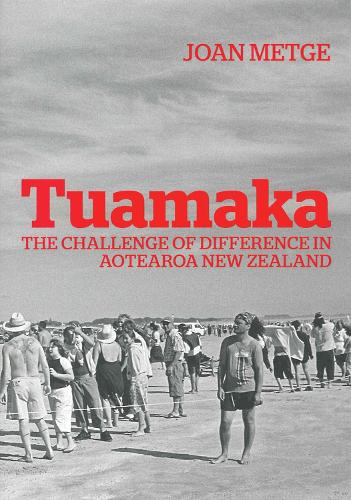
Tuamaka: The Challenge of Difference in Aotearoa New Zealand
(Paperback)
Publishing Details
Tuamaka: The Challenge of Difference in Aotearoa New Zealand
By (Author) Joan Metge
Auckland University Press
Auckland University Press
1st June 2010
New Zealand
Classifications
General
Non Fiction
Australasian and Pacific history
303.4820993
Physical Properties
Paperback
144
Description
"Tuamaka" is the rope that Maui and his brothers used to snare the sun. Plaited with flax, the rope gained its strengths from bringing together its different strands. In her new book, Tuamaka, our most renowned anthropologist Dame Joan Metge asks what sort of rope we need to forge our multicultural future. She identifies the Treaty, the words, and the stories with which all New Zealanders can gain the strength that comes from twining people and ideas together. The Treaty is our founding narrative, Metge suggests - and she tells a story of cultures meeting, arguing and then dealing with diversity. Maori and English, increasingly used in the same sentence, are our languages and Metge shows how Maori words are used and abused in everyday speech and the media. Finally, the art of storytelling - from myths of Maui and James Cook to present day whakapapa - is how we understand the land and ourselves. Dame Joan ends Tuamaka with a personal reflection on her life as a New Zealander and as an anthropologist living deeply within two cultures over six decades of field work. Tuamaka shows us all how as a nation we can turn the challenge of difference into one of our great national assets. In this moving book, our leading anthropologist delivers an engaging manifesto for living together in Aotearoa New Zealand.
Author Bio
Dame Dr Joan Metge was born in 1930. A trained anthropologist, she is particularly famous for her outstanding promotion of cross-cultural awareness. She has published significant books and articles on crosscultural communication, including Talking Past Each Other (1978/1984) and Korero Tahi (AUP, 2001), and on Maori history and society. She was awarded The Royal Society of NZ's inaugural Te Rangi Hiroa Medal in 1997 for her outstanding scientific research in the social sciences and, in 2006, won the third Asia-Pacific Mediation Forum Peace Prize, previously won by Jose Ramos-Horta.
